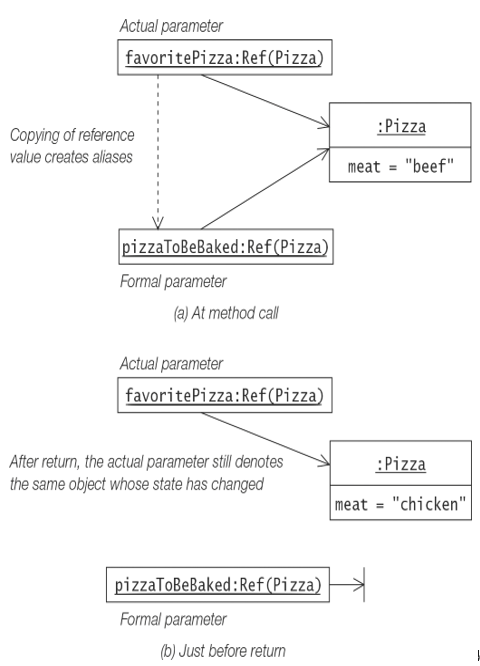Passing Reference Values
If the actual parameter expression evaluates to a reference value, the resulting reference value on the stack is assigned to the corresponding formal parameter reference at method invocation. In particular, if an actual parameter is a reference to an object, the reference value stored in the actual parameter is passed. Consequently, both the actual parameter and the formal parameter are aliases to the object denoted by this reference value during the invocation of the method. In particular, this implies that changes made to the object via the formal parameter will be apparent after the call returns.
Type conversions between actual and formal parameters of reference types are discussed in §5.10, p. 265.
In Example 3.11, a Pizza object is created at (1). Any object of the class Pizza created using the class declaration at (5) always results in a beef pizza. In the call to the bake() method at (2), the reference value of the object referenced by the actual parameter favoritePizza is assigned to the formal parameter pizzaToBeBaked in the declaration of the bake() method at (3).
Example 3.11 Passing Reference Values
public class CustomerTwo {
public static void main (String[] args) {
Pizza favoritePizza = new Pizza(); // (1)
System.out.println(“Meat on pizza before baking: ” + favoritePizza.meat);
bake(favoritePizza); // (2)
System.out.println(“Meat on pizza after baking: ” + favoritePizza.meat);
}
public static void bake(Pizza pizzaToBeBaked) { // (3)
pizzaToBeBaked.meat = “chicken”; // Change the meat on the pizza.
pizzaToBeBaked = null; // (4)
}
}
class Pizza { // (5)
String meat = “beef”;
}
Output from the program:
Meat on pizza before baking: beef
Meat on pizza after baking: chicken
One particular consequence of passing reference values to formal parameters is that any changes made to the object via formal parameters will be reflected back in the calling method when the call returns. In this case, the reference favoritePizza will show that chicken has been substituted for beef on the pizza. Setting the formal parameter pizzaToBeBaked to null at (4) does not change the reference value in the actual parameter favoritePizza. The situation at method invocation, and just before the return from method bake(), is illustrated in Figure 3.3.

Figure 3.3 Parameter Passing: Reference Values
In summary, the formal parameter can only change the state of the object whose reference value was passed to the method.
The parameter passing strategy in Java is call by value and not call by reference, regardless of the type of the parameter. Call by reference would have allowed values in the actual parameters to be changed via formal parameters; that is, the value in pricePrPizza would be halved in Example 3.10 and favoritePizza would be set to null in Example 3.11. However, this cannot be directly implemented in Java.
